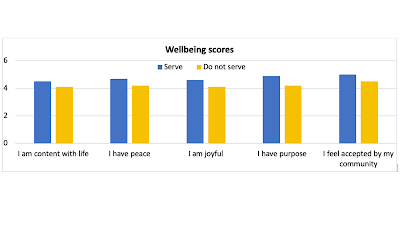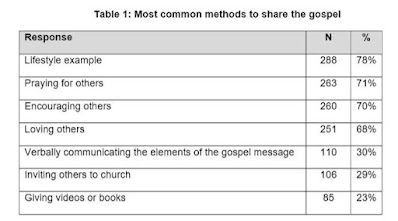Welcome back to my blog. This blog investigates what the Bible says about our relationship with God and how the scriptures influence our lives.
Today we discuss the enriching topic of service to other people both within and outside the church. The Bible emphasizes serving others as an essential principle of the Christian faith. To fully serve God we need to turn our thoughts away from ourselves, as we are able, and reach out to others, not only using gracious speech, but our actions as well (1 Peter 4:10).
How are we to act towards others outside the church?
We know that the church of Jesus Christ is pivotal for its members, which include all Christians, in promoting the walk with God as well research from Teleios and others has shown it promotes personal well-being. However, Christ sent us into the world to preach the gospel (Matthew 28:19-20) and not to live in an isolated fashion.
How, then, do we treat others outside the church?
The Bible gives us guidelines:
- Do good to all men (Galatians 6:10)
- Pray for all men and giving of thanks (1 Timothy 2:1-2)
- Be good citizens (1 Timothy 2:1-2; 1 Peter 2:13-15)
- Provide things honest to all men (Romans 12:17)
- Show love toward all men (1 Thessalonians 3:12)
- God wants all men to be saved (1 Timothy 2:4)
- As possible, live peaceably with all men (Romans 12:18)
- Be gentle to all men, apt to teach, patient (2 Timothy 2:24)
How are we to help others inside the church?
Scripture says that we are to assist each other (beyond how we treat each other) inside the body of Christ in a variety of ways:
- Be affectionate one to another (Romans 12:10)
- Bear one another’s burdens (Galatians 6:10)
- Provide social help to those in need (1 Timothy 5:1-16)
- Love one another (1 John 4:7)
- Comfort one another (1 Thessalonians 5:11)
- Serve one another (Galatians 5:13)
- Be hospitable to one another (Romans 12:13)
- Do not judge one another (Romans 14:13)
- Bear with one another (Colossians 3:13)
- Be subject to one another (1 Peter 5:5)
- Consider how to provoke others to love and good works (Hebrews 10:24)
- Exhort each other (Hebrews 3:13)
- Pray for each other (Hebrews 13:18)
- Fellowship with one another (1 John 1:7)
Teleios Research on service and wellbeing
Amazingly, the service we provide to others helps ourselves by enhancing our knowledge of God (Colossians 1:10), and our own wellbeing (please see below).
Of course, the benefit of serving others is not limited to the person giving but also to the individual or communities receiving the help.
Although the benefit of service has been little studied scientifically to our knowledge, we believe that assistance to communities and giving to individuals promotes a gracious and courteous culture which allows all to pursue their best.
Service and wellbeing study – Teleios recently evaluated the effect of personal service on wellbeing at Grace Community Church (https://teleiosresearch.com/wp-content/uploads/2013/06/CV-TELEIOS-GCC-II-CMHJ-2013.pdf). We surveyed 309 adults in two services on one Sunday.
The survey showed that individuals who routinely participated in a community or church-based service program, compared to those who did not, had better wellbeing scores in contentment, peace, joy, purpose, and community acceptance. Wow! Who wouldn’t want that? Additionally, people who served had a better global wellbeing score (average of seven questions together) than those who did not serve.
Interestingly, the study showed the benefit of service might occur with as little as one hour a week helping others! The benefit was even greater when people served up to 6 hours per week. In addition, the perceived benefit of the service did not depend on the type of service, whether inside the church or in non-church sponsored community service.
Why would personal service help wellbeing? We don’t know this answer for certain, but there are several potentials:
- Serving others provides us with a sense of purpose.
- Serving provides a comfort that our lives are useful.
- When we serve, we realize we are being obedient and living consistently with God’s desires.
- Our own problems are put into proper perspective not only by perceiving the suffering of other people but also by ordering our own priorities under God’s.
- By serving we focus less on our own troubles perhaps reducing the emotional burden of these problems.
In summary, service is fundamental to our Christian walk both inside and outside the church. It has the advantage of enhancing our own wellbeing, uplifting other individuals as well as our society in general and allowing us to know God better. Serving isn’t always easy, but God’s grace empowers us. Even small acts of kindness matter, and nothing we do for God is in vain.
Join us next week as we discuss the important topic of marriage.
William C. Stewart, MD
Email - info@teleiosresearch.com
Website - http://teleiosresearch.com/
Facebook - https://www.facebook.com/TeleiosResearch
Instagram - https://www.instagram.com/TeleiosResearch
YouTube - https://www.youtube.com/c/TeleiosVideos/
Disclaimer - This blog and its content are provided only as information and are intended for visitors 18 and older. No content on the website should be taken as advice or recommendation to any personal or institutional situation. The views expressed are those of the author alone and not necessarily either shared or endorsed by Teleios. Both the blog and the contents are subject to change at any time without notice. Although I endeavor to ensure that the blog and the content are current and accurate, it may contain errors. I do not represent that the blog or the content is current, accurate or complete, or appropriate for your specific requirements. I do not accept any liability from any person for the blog, the content or any other information (or the use of such information) I provide. I do not have a seminary degree, but I have trained myself in the scriptures to teach and provide this information. For any specific question, I suggest you contact experts in that field and or do your own research into the scriptures.






